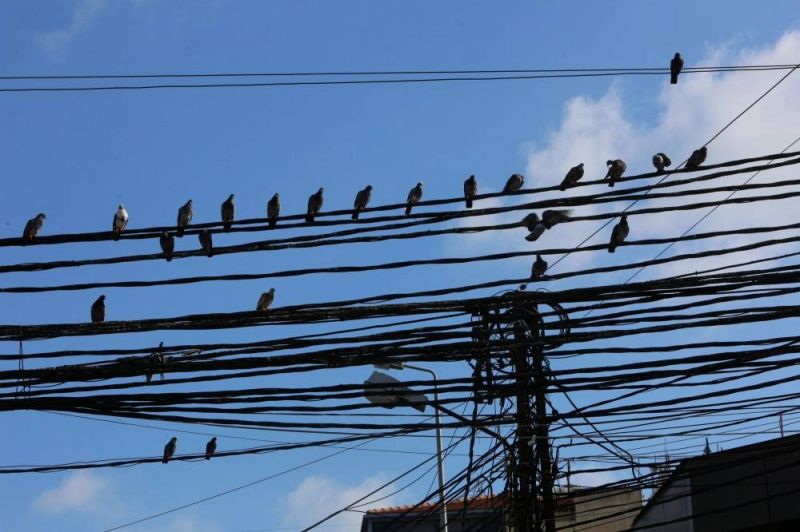
Birds sit on electricity cables in Sour, Lebanon. (Credit: Aziz Taher/Reuters/File Photo)
Want to get the Morning Brief by email? Click here to sign up.
Judge Charbel Abou Samra will dedicate a hearing scheduled for today with Banque du Liban governor Riad Salameh to answering questions from a delegation of European judges also investigating the central bank head, a senior judicial source told L’Orient Today. Upon learning that European investigators planned their return to Beirut for Monday, Abou Samra repurposed the hearing to include a list of questions the judge had received from the foreign magistrates last Thursday. A delegation of French, German and Luxembourgian judges held a series of hearings in January as part of their investigation into Salameh — who is the subject of at least five European probes. Paul Morcos, director of Beirut-based legal firm Justicia, warned that despite the priority accorded to the foreign investigation, Abou Samra could suspend his cooperation with the European investigators at a whim. Abou Samra scheduled the hearing last month after leveling a barrage of charges against Salameh, his brother Raja and one of his assistants. Salameh is accused of embezzling funds from the sale of BDL assets — which according to Swiss media, were placed between a dozen banks in Switzerland — through brokerage company Forry Associates, which lists his brother Raja as an economic beneficiary. Although Riad Salameh repeatedly denied wrongdoing, local television station Al Jadeed claimed he intends to break his hearing truancy streak today.
The lira fell to a record low of LL100,000 to the dollar on the parallel market yesterday, as commercial banks resumed their open-ended strike. President of the General Confederation of Lebanese Workers Bechara al-Asmar called for an increase to public workers’ salaries and army personnel’s transportation allowances amid the parallel market volatility during a meeting with caretaker Prime Minister Najib Mikati. The lira outpaced experts’ January forecasts for the parallel market exchange rate to breach the LL100,000-per-dollar mark by the end of the year. The factors behind the “lack of confidence” linked to the lira’s losses at the start of the year — namely the dual executive vacuum and stalled reforms — persisted as successive interventions by the central bank failed to provide sustained stability to the local currency. Mikati last month speculated that the election of a president and the formation of a new government would restore the parallel market exchange rate to LL30,000. Banque du Liban attempted to halt the lira’s depreciation by further empowering its Circular No. 161, which grants depositors access to dollars at the Sayrafa rate. The central bank rate stood around LL22,000 lower than the parallel market rate as of this morning. The ongoing bank strike, however, is expected to stifle any reprieve offered by Sayrafa rate conversions — which, even during normal bank operations, have drawn criticism from depositors for delays and from experts for betting on short-lived “psychological” effects. Supermarkets at the start of this month began displaying product prices in dollars.
“The World Bank is ready to reconsider the issue of financing [Lebanon’s] electricity sector” if a trifecta of Electricité du Liban (EDL) reforms is carried out, the bank's regional vice president Ferid Belhaj said. Lebanon needs to audit EDL, activate its newly announced regulatory authority and recover provision costs, caretaker Prime Minister Najib Mikati’s office said in a statement quoting Belhaj yesterday. International actors have repeatedly called for reforms to the electricity sector. The World Bank notably set reforms as a prerequisite for financing an agreement to receive electricity from Jordan and natural gas from Egypt, both via Syria, which would add up to 700 megawatts of power to the country's grid, increasing the power supply by several hours. Meanwhile, EDL subscribers have been rushing to cancel their contracts as increased tariffs come into force, in an attempt to mitigate electricity costs compounded by costly private generator subscriptions — an imposition forced by gaps in state electricity supply, which, on average, can cost Lebanese households nearly half their monthly income, Human Rights Watch said.
Private school teachers’ union head Nehme Mahfoud reported disparities across regions for the observance of yesterday’s strike. Mahfoud told L’Orient Today that “in the most disadvantaged regions, such as Tripoli or Saida, the strike was observed by about 70 to 80 percent of teachers,” while a smaller turnout was recorded in Beirut and Mount Lebanon. The union head claimed that the demands inciting the strike had already been met in some areas. Mahfoud added that "those who want to continue the movement will obviously be supported," but did not say whether the strike is officially extended. Meanwhile, public school teachers have repeatedly protested some unions’ calls to resume teaching in response to a government-granted fuel subsidy — announcing their intention to continue a strike ongoing since January until the government meets the entirety of their demands for improved compensation and healthcare coverage.
In case you missed it, here’s our must-read story from yesterday: “Lebanon’s nursing community reaches breaking point”
Compiled by Abbas Mahfouz